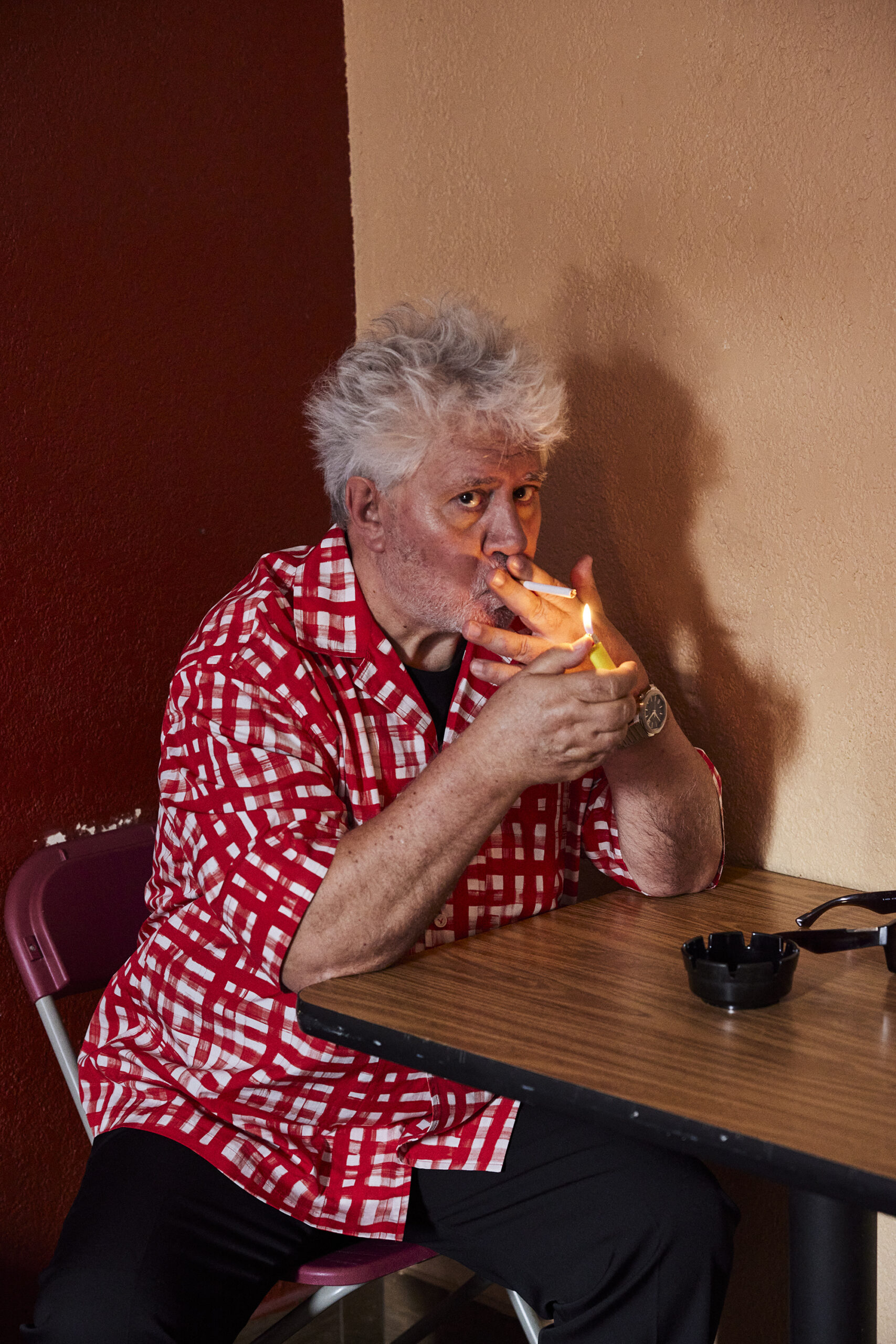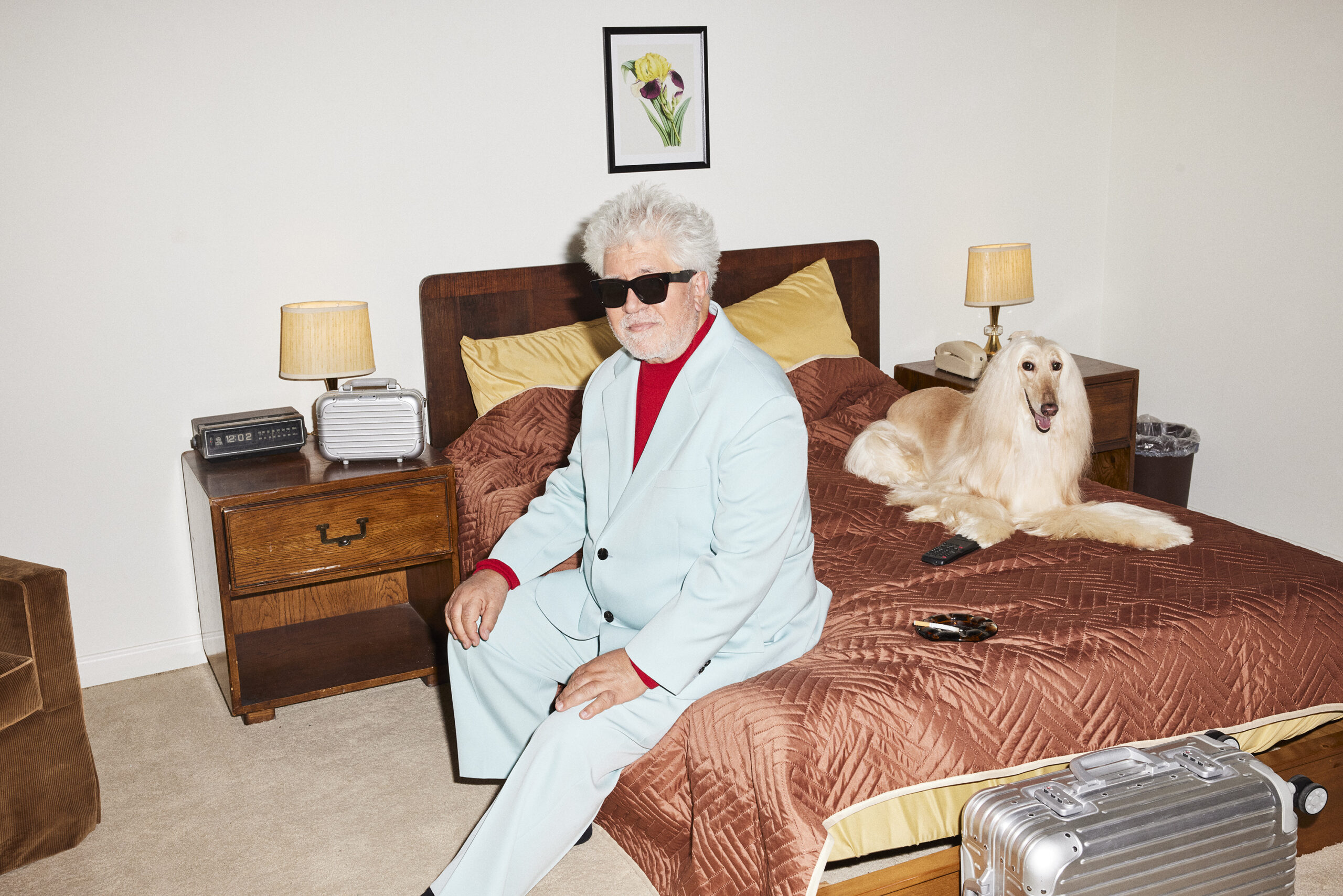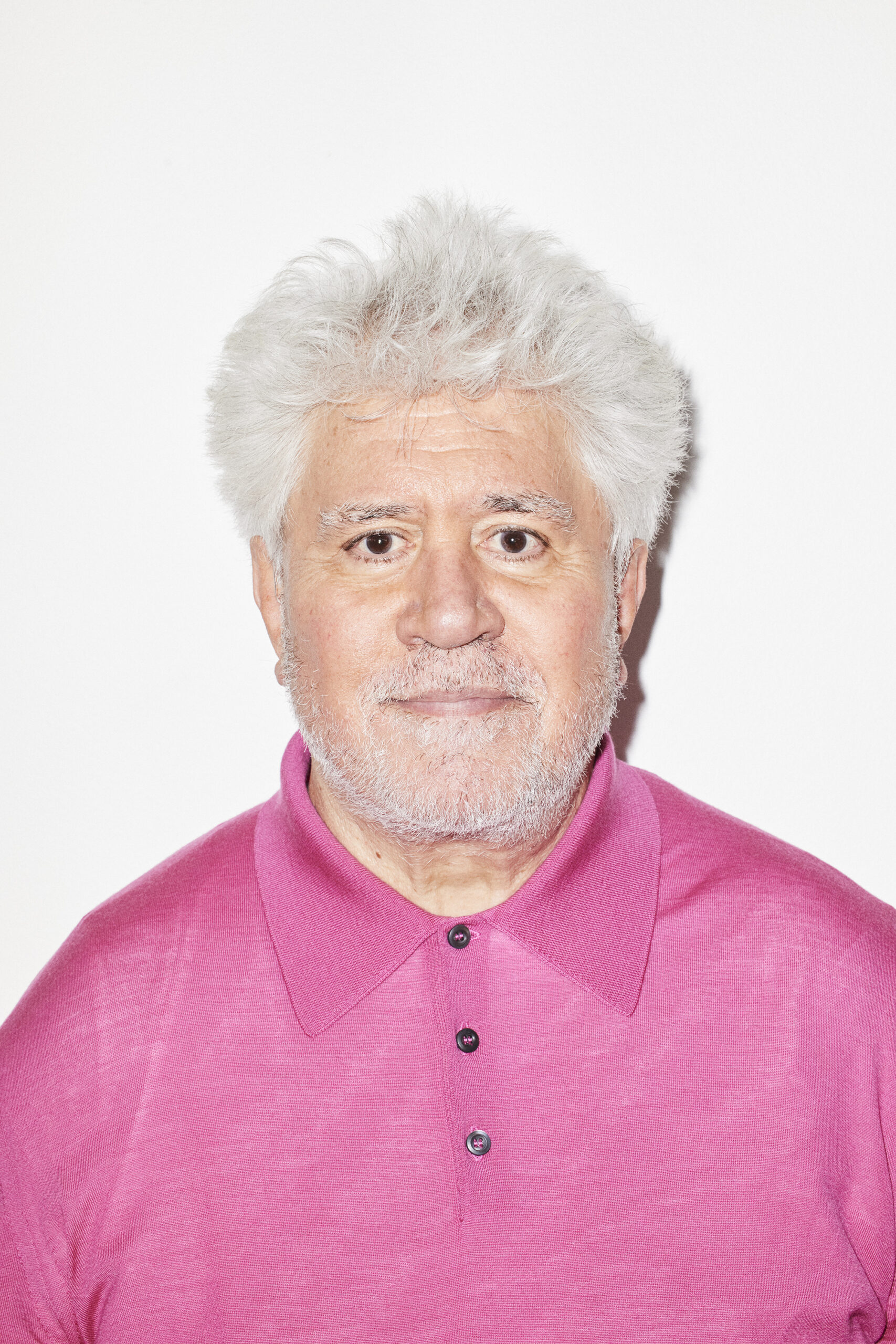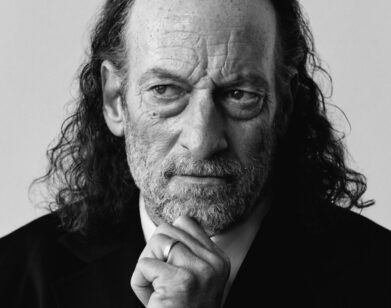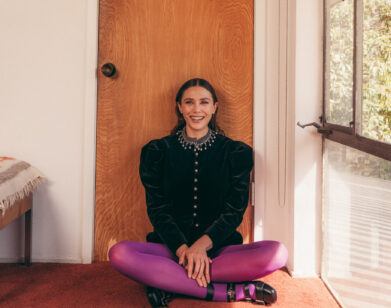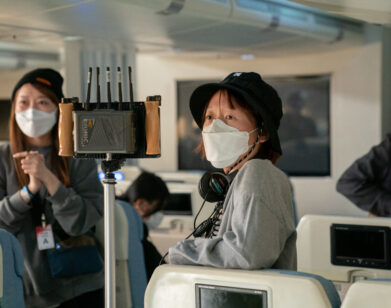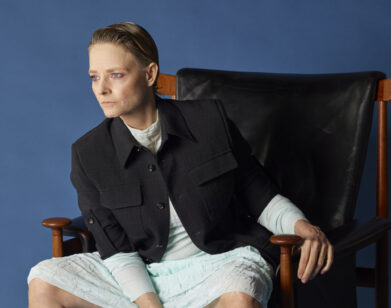DIRECTOR
Pedro Almodóvar and Celine Song on Love, Death, and Making Movies
Pedro Almodóvar may not have single-handedly reinvented Spanish cinema, but his subversive brand of exuberant, over-sexed, high-camp tragicomedy has become a projection of the national character. Starting in the punk, post-Francoist days of the early ’80s, the director focused his lens on highly stylized explorations of sex (Tie Me Up! Tie Me Down!), romantic obsession (Law of Desire, with a smoking-hot young actor named Antonio Banderas in the role of the jealous gay killer), thorny family relations (All About My Mother), and basically any runaway plot involving cheating boyfriends, deranged exes, lost mothers, horny Madrileños, and a slapstick cameo by Rossy de Palma. In recent years, the director’s films have taken a more stoic turn. Still, nothing has prepared his fans for his latest effort: the composed yet gut-wrenching story of Martha and Ingrid, two female friends played by Tilda Swinton and Julianne Moore, who reconnect in late middle age as one succumbs to cancer. The Room Next Door is the director’s very first English-language film and much of it was shot in and around New York City. Fitting, then, that on a recent visit back for the New York Film Festival, Almodóvar took a break to talk with director Celine Song about love, death, and the difference between American and Spanish actors.
———
THURSDAY 7:30 PM OCT. 3, 2024 NYC
CELINE SONG: I was just thinking about how you shot New York, seeing it through your eyes.
PEDRO ALMODÓVAR: I really tried not to present this town physically. I tried to not make this a picture from a foreigner, so I tried to be more austere.
SONG: Yeah.
ALMODÓVAR: The city’s landscape is spectacular, but the story demanded to be more contained. Otherwise, I would’ve shot all the marvelous things you see when you go out to the street.
SONG: Totally.
ALMODÓVAR: So I really focused on trying to capture the characters coming in and out of buildings, keeping it simple. But it was very exciting to shoot in a city that I really, truly adore.
SONG: I could feel that you loved it.
ALMODÓVAR: And also, because the main part is all at the hospital, or in the house, we shot it in a studio in Madrid.
SONG: No way!
ALMODÓVAR: When I did shoot outside, it was in Jefferson [Market] Garden, where they’re kind of gossiping with each other, except that what they’re gossiping about is Virginia Woolf and Leonora Carrington.
SONG: Yes, right.
ALMODÓVAR: They’re talking about whether these two historical characters were fated to die, and that allows me to transition to Martha asking Ingrid, “Do you think that way back when you
knew me in the ’80s, I too was condemned to die early?”
SONG: That’s so interesting, because I feel like only when we talk about mortality do we actually end up feeling more alive. To me, the movie is very much about that, how these
two women feel like they haven’t lived like this in such a long time, and they’re rediscovering what it’s like to live the way they did as younger women, because one of them is dying. And not only that, she’s trying to find a way to die in a way that feels alive.
ALMODÓVAR: This is also very similar to your film, a story of two people who meet again after a certain amount of time, and how that friendship flourishes just as strongly as it had back then.
SONG: Yes.
ALMODÓVAR: And mortality means two very different things to each of them. Martha is prepared for it and lives it with vitality, whereas Ingrid is not ready for it and is scared of it. But in a way, both women are very courageous. Tilda’s character has been a war correspondent and she’s been courageous in that sense, and even though Julianne’s character is more fearful, she is still adventurous and has made this decision to face something that is actually scary for her.
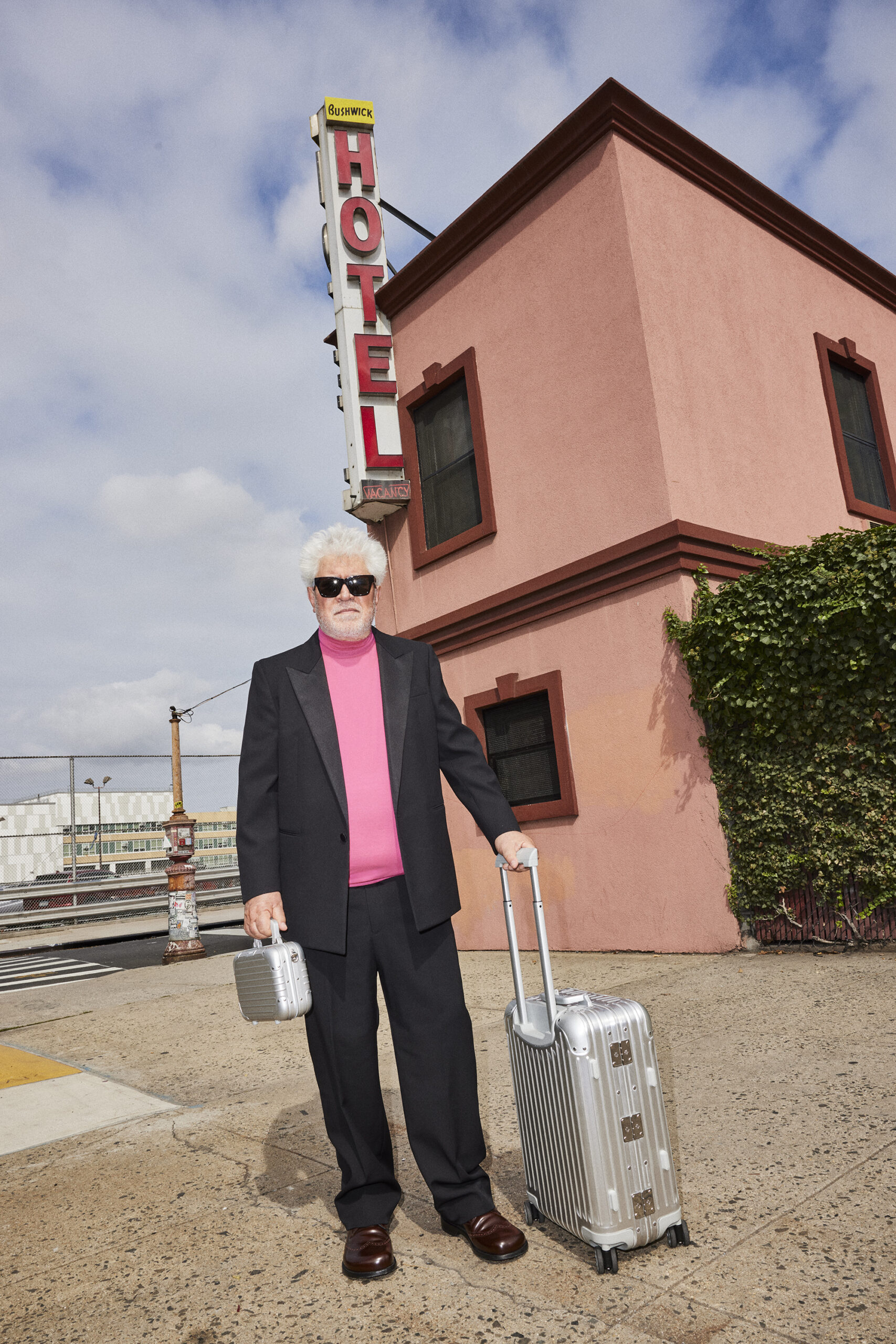
Tuxedo, Turtleneck, and Shoes Pedro’s Own. Sunglasses Burberry. Original Bag in Silver and Original Cabin Rimowa.
SONG: Her job as a war journalist makes her an expert on death, too. But of course, in some way, all of us are in touch with death, because we’re all going to do it. [Laughs] But if you’re a war journalist and you’re so much closer to death, as a result, you become a bit of an expert.
ALMODÓVAR: Absolutely. And she said she wrote about many wars, but this war against cancer, she cannot write about. It’s like being a correspondent of her own death. And as a reporter, she created a kind of mobile family. I read books about these kinds of reporters. At the end of the day, there’s so much tension that they all drink and fuck a lot. As she said, “I behaved like a man because it was a man’s world.” I like that she talks about sexuality so freely, as a way to face death. She was always with someone, never alone. That’s why she asked Julianne to be next door.
SONG: Of course.
ALMODÓVAR: Not in the same room, but in the room next door.
SONG: To care for somebody in the room next door seems to be at the heart of this story. There’s a way that she could have asked somebody who is maybe more intimate to her—especially, for example, her daughter—somebody who she has some kind of right to ask for care. But instead, she wants to feel connected to a friend. And she doesn’t say, “Come sit next to me.” She says, “I want you to be in the other room.” That’s the kind of caring for another
human being that I think is so—I don’t know, there’s something about the boundary of the room, the door, that’s so moving, because this is something that we all can do. Of course, there are people who are our family who I can’t be in the other room for. I have to sit next to them and hold their hand. But there’s also a whole world of people that we are sitting in the other room of.
ALMODÓVAR: It represents that hand that we give to our relatives.
SONG: This movie being in New York means a lot to me because I actually live here, and I always think about how I’m in the room next door to the millions of people who actually live here. That’s what I love about the city so much. Every day you are a neighbor to someone, whether you like it or not. It doesn’t mean that I know everyone or that I talk to everyone. I’m not that kind of person. But I know that there’s intimacy in the apartment complex I live in, or in the street. When I go to get a bottle of water, I walk past hundreds of people, and they’re all people who live in the room next door, which is why I feel like this movie had to be set in New York.
ALMODÓVAR: I agree.
SONG: Something that I was thinking about is, as Ingrid was going through this, she learned something and got strength from Martha. But also, Martha chose Ingrid to be this person because she knew this person could be capable and has her trust. I think this about friends in my life. My joke is that in the zombie apocalypse, whose car would I get in? There are friends whose car I would get in, and then there are friends who I would just make sure we all get in the car. That doesn’t mean that I love one friend better or worse than another friend. It means that actually there are different strengths.
ALMODÓVAR: There’s a particular friend that is more adapted to that particular situation.
SONG: Exactly. And there are some friends who I want to protect as well. And also, it depends on what you’re going through. It might be a zombie apocalypse, it might be that you’re ill, it might be that you’re grieving something. You have different people in your life who you know can handle certain situations better.
ALMODÓVAR: Absolutely.
SONG: The truth is, if my friend who was in a situation like Martha asked me to be the person who will sit in the room next door, I would feel so honored.
ALMODÓVAR: This is a beautiful way to see it, because also Ingrid thinks at the beginning that she’s not so courageous.
SONG: Yes. Do you improvise on set?
ALMODÓVAR: I improvise a lot in my life. When I shoot, even where I have everything very planned out, I still allow myself the space to improvise. So I need my actors to be very flexible. They know the lines, but I can change it. And at least in Spanish, I’ve done it many, many times—but not only the lines. In Law of Desire, the scene with the hose was an improvised scene. A janitor was just cleaning the street as we were shooting the scene, and I said to Carmen Maura, “Do you mind if I ask him to hose you down?” And she said, “No, I don’t mind.” She was very brave and he agreed. So then we shot that scene, and for me, that was the biggest expression of desire. And we did it in one take, because we only had one dress.
SONG: Of course.
ALMODÓVAR: Sometimes I will write a scene the night before and it becomes a very critical scene for the film. How much do you rewrite your first draft?
SONG: The shooting draft for me stays, but in Past Lives, the scene between the main character and her husband in the bedroom, where they talk about dreaming in another language—that came so late in the draft, and now I’m like, “How could you have a movie without that scene?” So I think that can happen. And the new movie I just made, there was a moment where there was a piece of dialogue—literally two lines—that I texted to my actors the day before, being like, “You need these two lines.” And then they had to memorize them.
ALMODÓVAR: I understand that. This is what I do.
SONG: I think we are preparing so much so that we can be spontaneous
on the day of. Because if the preparation is not there, it’s too chaotic and I can’t be spontaneous.
ALMODÓVAR: Absolutely. I can make adaptations because the whole movie is in my mind; I know it by heart. I oftentimes will adapt dialogue to the actors, sort of as you would a tailored suit. Of course, I write the script. I correct that at least nine times. But when you are rehearsing—without breaking the character that I’ve written—I might, if I realize that a particular actor is very good at a contained emotion, for example, or another actor is better at being more expressive, slightly adapt my dialogue around that. This is normal. I don’t like in general how the Spanish people walk.
SONG: You don’t like the way they physically walk?
ALMODÓVAR: Yes. American actors are much better walkers.
SONG: [Laughs] Really? What do you mean?
ALMODÓVAR: They are more in their physical body. More sporty and holding it up, whereas Spaniards might be a little bit heavier in their gait. For example, one of the actresses I worked with, I didn’t like the way she walked—a little bit with her legs separated. She is a great actress, but I decided not to make a general shot of her because then—
SONG: That’s so surreal, because I—
ALMODÓVAR: But you have to.
SONG: No, you have to. To me, I think of my actors like they’re my spouse. You chose them, and you love them, and you know them so intimately that there are so many things that are their strengths that made you love them, but also there’s so many flaws that drive you crazy. And then you have to constantly decide if you’re going to accept them, try to correct them on set, or try to correct them in post-production. But I usually find that, just as you eventually have to accept your partner’s whole being, there are moments where I accept everything about my actors.
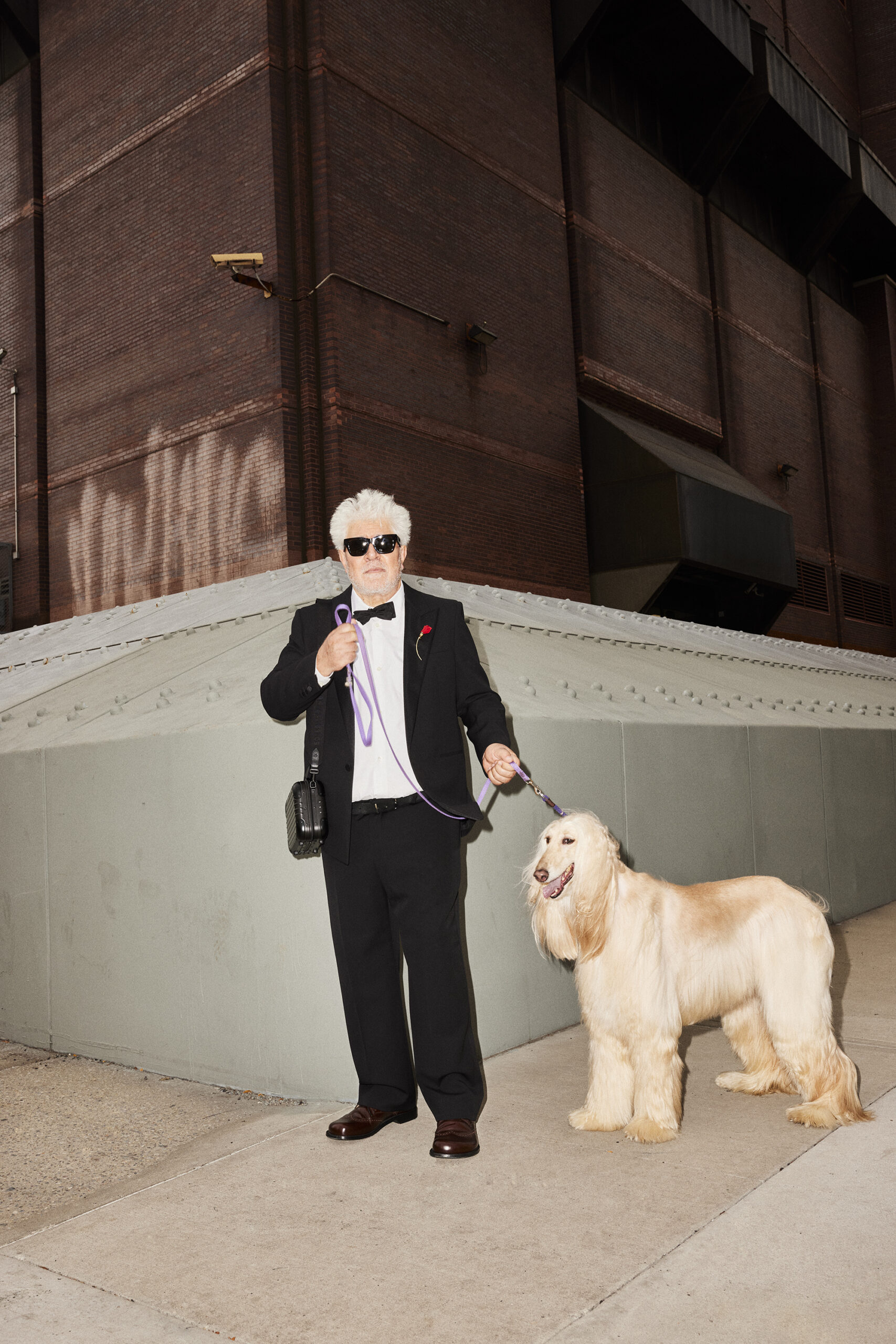
Tuxedo, Shirt, Belt, and Shoes Pedro’s Own. Sunglasses Burberry. Bow Tie Thom Browne. Brooch Tiffany & Co. Original Bag in Black Rimowa.
ALMODÓVAR: It’s true. It’s good in life and also in movies to accept the actors completely.
SONG: Exactly. I’m still so controlling that I am happy to change dialogue, but they can’t do it when we are shooting. So they have to do it in rehearsal or they can do it on set. I think my actors have autonomy when it comes to pitching me. It’s kind of saying, “This part of the suit is not fitting that well. Do you think I can adjust it like this?” And I almost always love it, because it usually comes from a very respectful place of, “I love the garment, I just need this adjusted.” I think I saw in an interview that you don’t write for specific actors, but you create the character and then the actors step into it. And that’s exactly how I feel. It’s very much like you create a suit that is a character, and then the actor who’s stepping into it should be the right shape for the suit. Who’s going to look great in the suit? But once they’re in, yes, there has to be tailoring.
ALMODÓVAR: I suggest to them much more than they suggest to me.
SONG: Oh yeah?
ALMODÓVAR: I have the feeling that when I’m rehearsing with the actors, the actors are giving me a lot of information without realizing.
SONG: Yes, of course. I talk about defensive acting, where the actors are trying not to be bad, versus what you want, which is that the actor is so open to every possibility that they’re able to walk the edge of something that could be bad, because that’s the only way that you can be great. There has to be so much safety that they’re able to act without fear of losing that safety.
So to do that, you have to protect them so completely.
ALMODÓVAR: Absolutely.
SONG: And you have to love them deeply, right?
ALMODÓVAR: Absolutely.
———
Grooming: Thomas Dunkin using R+Co and Mario Badescu at Art Department.
Prop Stylist: Alice Jacobs at Walter Schupfer Management.
Fashion Assistant: Willa Schwabsky.
Production Assistant: Kiernan Francis.
Location: Boerum Studios.
Special Thanks: All Tame Dogs.

